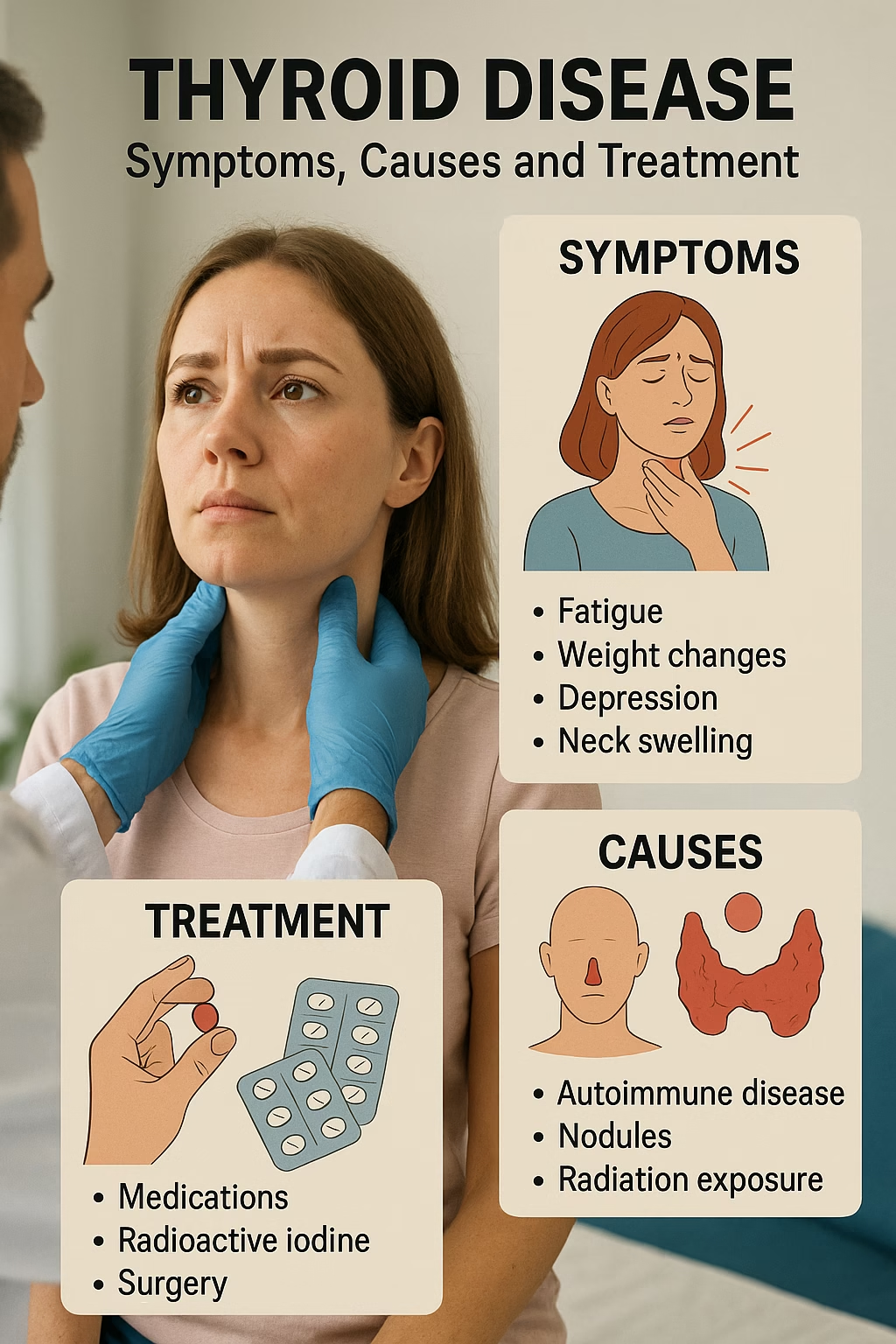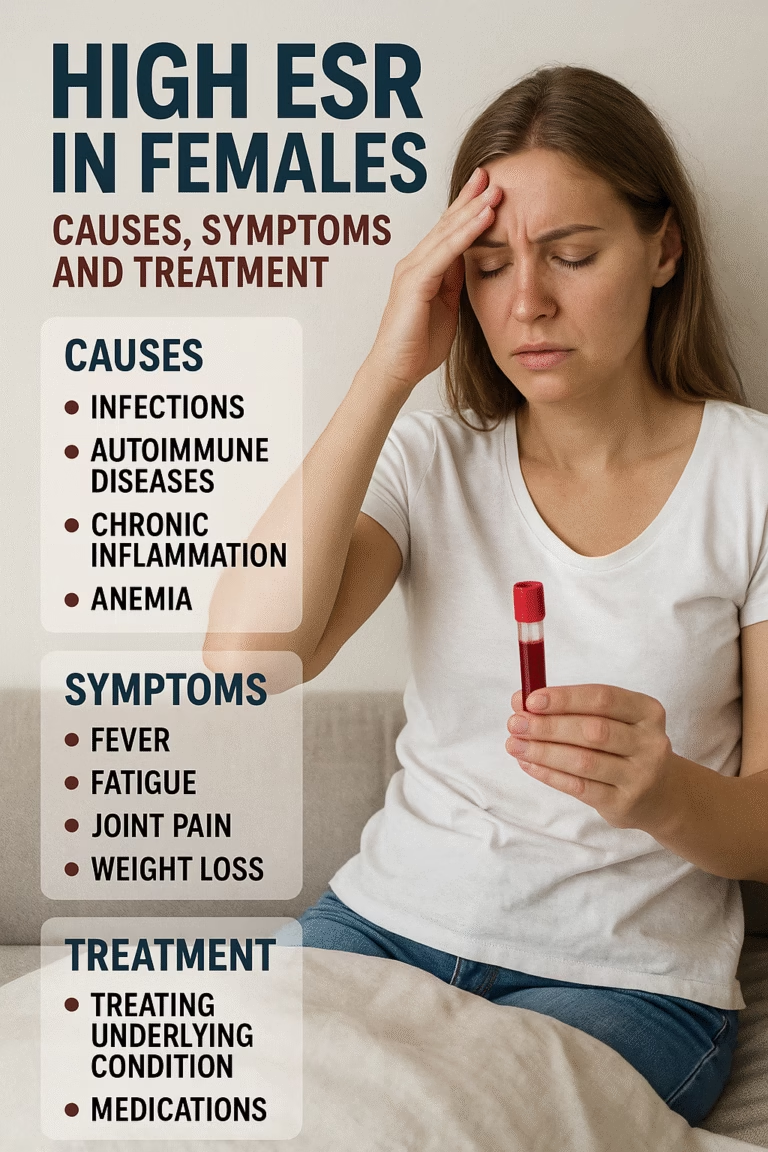
The thyroid gland is a small, butterfly-shaped gland located at the base of the neck, yet it plays a crucial role in overall health. It produces hormones that control metabolism, energy levels, body temperature, and mood.
When the thyroid fails to function properly, it can cause thyroid disorders that affect millions of people around the world. These conditions can result in a wide range of symptoms, including unexplained weight changes, fatigue, and mood swings.
In this article, we’ll go over everything you need to know about thyroid disorders, including their causes, symptoms, diagnosis, prevention, and treatment, so you can better understand and manage this common health issue.
What is Thyroid Disease?
“Thyroid disease” is a general term for conditions that affect the thyroid gland, a butterfly-shaped gland located in the neck. This gland produces hormones that control metabolism, growth, and energy regulation.
There are two main types of thyroid disorders:
- Hyperthyroidism:
- Excess thyroid hormones increase the body’s metabolism.
- Fatigue, rapid heartbeat, weight loss, and irritability are some of the symptoms.
- Excess thyroid hormones increase the body’s metabolism.
- Hypothyroidism:
- When the thyroid produces insufficient hormones, the body’s processes slow down.
- Symptoms include weight gain, fatigue, and sensitivity to cold.
- When the thyroid produces insufficient hormones, the body’s processes slow down.
What are the causes of thyroid diseases?
The causes vary depending on whether you have hyperthyroidism or hypothyroidism.
Causes of Hypothyroidism:
- Thyroiditis: The thyroid gland becomes inflamed, resulting in reduced hormone production.
- Postpartum Thyroiditis: It is a temporary condition that affects 5-9% of women after childbirth.
- Iodine deficiency: The thyroid requires iodine to produce hormones. A lack of iodine can cause hypothyroidism.
- Hashimoto’s Thyroiditis: An autoimmune disorder in which the immune system attacks the thyroid gland.
- Congenital Thyroid Failure: Certain babies are born with underactive thyroid glands, which can impair growth and development.
Causes of Hyperthyroidism:
- Graves’ Disease: An autoimmune disorder that results in goiter, or an enlarged thyroid, and excessive hormone production.
- Excessive Iodine Intake: Too much iodine triggers overproduction of thyroid hormones.
- Thyroiditis: Temporary release of stored thyroid hormones due to inflammation, which can last for weeks or months.
What are thyroid disease symptoms?
The symptoms vary depending on whether the thyroid is overactive or underactive.
Symptoms of Hyperthyroidism (Overactive Thyroid):
- Irritability and anxiety
- Sleep disturbances
- Unexplained weight loss
- Goitre (enlarged thyroid gland)
- Irregular menstrual cycles
- Vision problems or eye irritation
Symptoms of Hypothyroidism (Underactive Thyroid):
- Weight gain
- Memory issues or forgetfulness
- Dry and brittle hair
- Feeling cold easily
- Heavy or frequent menstruation
- Fatigue and weakness
How Thyroid Disease is Diagnosed
Thyroid disorders can be challenging to diagnose since their symptoms often resemble other conditions. Common diagnostic methods include:
- Blood Tests: Measure thyroid hormone levels (T3, T4, TSH).
- Imaging Tests: Ultrasound or radioactive iodine scans to check for nodules or enlargement.
- Physical Examination: Checking for swelling, lumps, or other signs of thyroid dysfunction.
Prevention of Thyroid Disorders
Although we cannot prevent all thyroid diseases, we can reduce the risk by making certain lifestyle choices.
- Maintain adequate iodine levels through a balanced diet.
- Avoid excessive iodine intake, as it may trigger hyperthyroidism.
- Limit soy products, as they can interfere with hormone production.
- Quit smoking, as it negatively impacts thyroid health.
- Regular health checkups for early detection and management.
Treatment options for thyroid disease
Treatment depends on whether you have hyperthyroidism or hypothyroidism.
The primary goal is to normalize hormone levels.
For Hyperthyroidism (Overactive Thyroid):
- Anti-thyroid medications: Methimazole and propylthiouracil are two examples of medications that decrease the production of hormones.
- Beta-blockers: Assist in controlling symptoms such as anxiety and a fast heartbeat.
- Radioactive Iodine Therapy: Destroys overactive thyroid cells, reducing hormone production.
- Surgery (Thyroidectomy): In severe cases, the thyroid gland is partially or completely removed.
For Hypothyroidism (Underactive Thyroid):
Thyroid Hormone Replacement Therapy:
- Synthetic thyroid hormone medication (e.g., Levothyroxine) helps restore normal hormone levels.
- Regular monitoring ensures proper dosage and effectiveness.
Conclusion
Thyroid disease is a common but manageable condition. Early diagnosis, appropriate treatment, and lifestyle adjustments can help you regulate thyroid hormone levels and maintain good health. If you notice symptoms such as unexplained weight changes, fatigue, or mood swings, see a doctor promptly for evaluation and care.
Also read: Foods that can control Blood sugar
Frequently Asked Questions (FAQs)
Can thyroid disease be completely cured?
Thyroid diseases can be effectively treated, and with the right medication, thyroid function can be restored. However, in many cases, ongoing treatment may be necessary.
What are the most common causes of thyroid disorders?
The primary causes are iodine deficiency, autoimmune disorders (Graves’ and Hashimoto’s disease), viral infections, and thyroid nodules.
Is thyroid disease a serious condition?
Yes, untreated thyroid conditions can result in serious health problems like heart disease, infertility, and, in rare cases, thyroid cancer.
How can I manage my thyroid naturally?
A nutrient-dense diet, particularly foods high in vitamin A, along with regular exercise, stress management, and adequate sleep, can all help to support thyroid health.




